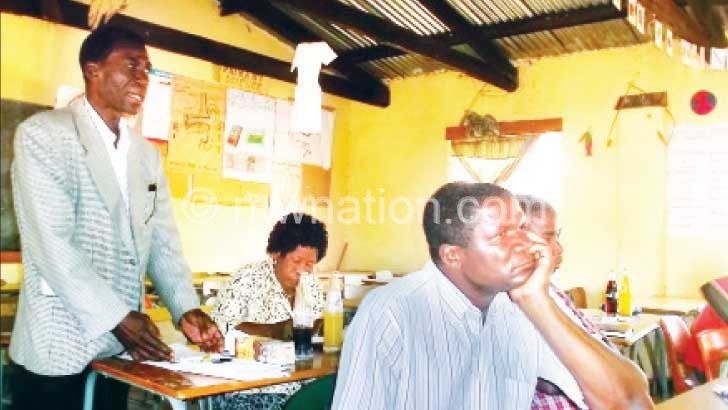Is empowering citizens on their rights necessary?
Power is intangible, but crucial; a subtle and pervasive force field connecting individuals, communities and nations in a constant process of negotiation, contestation and change, writes Duncan Green, a strategic adviser for Oxfam GB and author of From Poverty to Power.
Development is, at its heart, about the redistribution and accumulation of power by citizens, he adds.

Green urges that much of the standard work on empowerment focuses on institutions and the world of formal power—can people vote, express dissent, organise, find decent jobs, get access to information and justice?
The very first step of empowerment, he says, takes place in the hearts and minds of the individuals who ask: ‘Do I have rights? Am I a fit person to express a view? Why should anyone listen to me? Am I willing and able to speak up, and what will happen if I do?’
These are important questions communities around Phirilongwe Health Centre in the area of Traditional Authority (T/A) Chilipa in Mangochi are now able to ask thanks to rights empowerment programmes by National Initiative for Civic Education (Nice) Trust.
Until November 2015, communities in the area never thought they had a constitutional right to demand for development.
The road network in the area was poor, bridges were breaking apart, clinics had been no personnel and potable water was not available.
“We also lacked security, education and agriculture, but our main concern was health services,” says Brandi Sabiti, a resident in the area.
Phirilongwe has a health centre but there had no personnel to assist sick people for three months.
He says over 20 000 people from villages around the area depend on the health centre.
“Our area recorded four preventable deaths due to the mishap at the time,” Sabiti says.
Seeing this challenge, Nice Trust embarked on empowering the communities with civic education on how they can demand services from government.
Through meetings, Nice Trust enlightened the communities the rights they have and how they can take to task non-performing service providers and duty-bearers in a quest to enhance development in their area.
“Nice Trust has empowered us to get organised and petition the office of the DHO,” says Sabiti who was elected vice chairperson of Phirilongwe Health Advisory Committee (HAC).
According to Sabiti, after the communities petitioned the DHO and it did not take long before a health personnel were sent to health centre.
“A medical assistant was deployed a week later, something that brought joy to our community on one hand as recipients and Nice Trust on the other hand as an advocate,” he says.
Communities of Phirilongwe are not alone in this predicament. There are many other areas in the country where citizens are suffering in silence because they do not know their rights. Is empowerment on rights important?
Human rights activist, Billy Banda who is also executive director for Malawi Watch in an interview says the citizenry should be empowered on their rights and responsibilities because it is enshrined within the Constitution.
He said the constitution spells out clearly that the citizenry should know their rights and that Civil Society Organisations (CSOs) should be in the forefront civic-educating them.
“Irrespective of creed, colour or political affiliation one has to be aware of his or her right on essential services and the constitution guarantees about that. And more so since Malawi moved from autocratic rule to multiparty dispensation greater efforts should be made by CSOs to bring awareness to the masses to enable them to demand better and quality services from the service providers and duty-bearers,” stressed Banda.
He said communities from Phirilongwe should not have stayed over three months without the health personnel and subsequently lose four people to preventable deaths had it been that the people had civic information.
“Likewise, communities around Lirangwe, Zomba and Machinga could not have to wait for Nice Trust to empower them if they had received civic empowerment before,” added Banda.
While calling government and CSOs to make deliberate efforts to step up civic empowerment messages, he bemoaned donors for focusing on International Non-Governmental Organisations (INGOs) at the expense of local NGOs with resources which he said has affected people not to know the constitution.
Pan African Civic Educators Network (Pacenet) executive director, Steve Duwa chipped in that it is imperative for the citizens to be empowered on their rights as it is a therapy that would make them to question their duty-bearers when they are not delivering.
“What was happening in the two areas (Mangochi and Zomba) shows that people were not empowered and this has adverse effect on the socio-economic development of the country. This is a tip in an iceberg that should poke us (CSOs) to do something in terms of enhancing our civic education,” he remarked.
Added Duwa: “Citizens or community empowerment enables people to gain control over certain things in the community and are able to make decisions that shape their lives. It seeks to empower individuals of people with skills they need to effect change within communities, create social groups working for a common agenda, hence, translates development.”
He, however, called the citizens to be vigilant and start demanding quality and sustainable services from the service providers and duty-bearers after they have been empowered, saying it is incumbent upon to them. n





